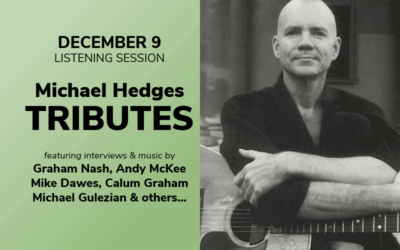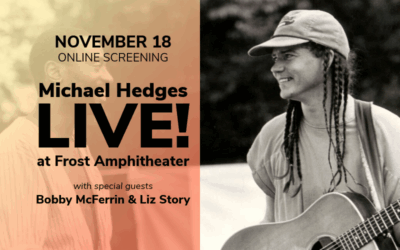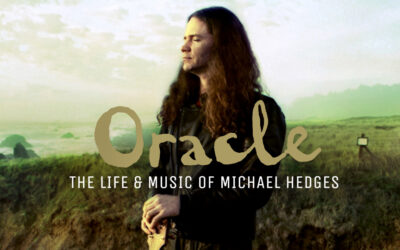
Patrick is a songwriter who collaborated with Michael on writing and recording in the mid 1990s. Learn more about Patrick and his music at PatrickBrayer.com.
The following post was written in April 2020. It is re-posted here with his permission.
There is no present moment in time. Case closed.
The present is much quicker and stealthier than that.
The actual present is just a sword swish. Try to be too present in that and you might well lose an arm. Venus de Milo is a classic example.
The past, which is usually the sole barking subject of memoir, is just a string quartet of smoke, knee-deep in the ghosts of iron and ice.
Things die from day one, and then we find, using rationale, that we haven’t a sturdy enough shelf for the resulting mystery. That in a nutshell is the human condition.
I conclude that all great works are based more on mystery than on fact, despite contrary belief.
Upon reflection I guess you could see this piece as a 23-year late sequel to my Starseed Eulogy (December 1997).

Our mystery here starts on August 10, 1996, the day I got a call from my pal Michael Hedges on my ruby red rotary-dial telephone.
He was inviting me to meet up with him at The Roosevelt Hotel in Hollywood, and asking if I might escort him later that day to the Greek Amphitheatre. He was scheduled to open up for Crosby, Stills, and Nash, and suggested that I might pick up some jalapeno chilis at the store on the way, for us to juice with some carrots that he had brought.
I gassed up my crumpled eggshell pale Ford Courier, pushed back some of the springs ‘jack-in-the-boxing’ through the red vinyl upholstery, and climbed us, the jalopy and I, onto the west bound I-10. It was as a vehicle, Tom Joad worthy, but it had plenty of room for a couple of siamese-twin shaped harp-guitars.
My bumper sticker read loud and clear, “Give Me Ralph Stanley or Give Me Death”. My friend, photographer Robert Morrow (City of Quartz) once said that he would like to get one of those stickers himself, but that he was afraid, it being Fontana, that someone might take him up on the deal. Both were wise men.
When I finally arrived at the world-famous Roosevelt Hotel, I was met in tourist-shock by all the neck twisting palms and Spanish Colonial architecture.
I couldn’t help but be tickled by the fact upon entering the lobby that Billy Barty, the legendary dwarf, was performing in the lounge. Ceiling fans gently chopped the wealthy air. The hotel, built in 1926, had among its financiers Mary Pickford, Louis B. Mayer, and Douglas Fairbanks Jr. The compound sported eight restaurants, bars, and lounges, one of them being the vaudevillian-inspired theatre, Beacher’s Madhouse, which is where Barty would hold court.
I ushered my way, avoiding the cult drunk stares of the bellhops in rayon monkey suits, up a gilded elevator where the door spread, and there was Michael Hedges, standing on his head, posed and smiling like only a yogic devote could, attired in his standard jester-like clothing. It was a style of apparel somewhere between Willie Shoemaker and Lightnin’ Hopkins.
Once inside we sent down for sandwiches and a couple of White Russians to lube the way, anticipating our Frankenstein juice experiment.
Dulled by the confusion that he had never heard of Billy Barty (how?) we gathered our vittles of the field, carrots, kale greens, ginger, and the acquired Fontucky jalapenos. All was going smoothly and as planed when gleefully as we were introducing the jalapenos to the juicer’s teeth, I kid you not, all the power on the entire west coast went out.
It was said to have started at 3:45 PM when a powerline sagged into some filbert trees in Hillsboro, Oregon, starting a fire and a power outage that hopscotched across seven left-coast states, from Canada to Baja Mexico.
This was the kind of things that happened with Mike Hedges.
We waited, drinking what there was of our grid-lock juice blend and still the electricity never came back. It was close to time to head for soundcheck, so we rounded up the family of harp guitariture and loaded the curbside truck and made slap stick attempts to imagine our way to The Greek Amphitheatre.
In the residue of the power outage none of the winked-out traffic lights were functional. Everyone was just making it up as they went along, mind you this is Hollywood Blvd.
It was the closest thing to a video game that I’ve ever been involved in, and keenly set the tone for the whole evening. We finally landed at the venue, brought the equipment backstage, amid the chiaroscuro ‘séance in wait’ candlelight.
Mike suggested that we head for the band buses which were parked on the perimeter of the property below a shady stand of eucalyptus. The personages of Crosby, Stills, and Nash were as famous for not getting along as they were for their iconographic musical stronghold on Folk Rock.
Hedges suggested Gram Nash’s coach and we climbed inside. Graham was someplace better, but we settled in with some of the road crew and entertained ourselves by watching a televised news program on a battery-operated television.
You have to remember all the power was off on the entire west coast, so nobody else was watching this. The funny part about it was that the news announcers weren’t even trying because they knew no one was watching. So, they were just jokingly mocking themselves for their own amusement. It reminded one of every other Saturday Night Live skit.

The happy ending to that leg of the adventure was in that the power came back on by showtime, and Mike opened up to a daylight crowd just filtering in, doing his usual cosmic show, and then brought out his secret weapon, his yoga teacher Pauli Zink, to do some sort of sword-wielding dance beside him as he played.
It was in the dressing room beforehand that I first realized something, that I guess I always assumed that Mike played really hard physically to get all that sound, and up the side of the head slap-harmonics, out of the guitar.
But as he was getting ready to go out, he played just a snatch of a song and I could see how gently he was attacking it, like he was putting an bird’s egg back up in its nest.
On that note, I always like what he said one time in response to people asking him how he got such a self-realized approach to the guitar. His response was to the effect that he wasn’t trying to play the guitar historically, but that he had music in his head, and was trying to get it out, and that he just happened to be holding a guitar.
So, in my mind, he managed to transcend the history of the instrument.
Michael had made plans to visit the Zappa family after the show, so we didn’t have time to stay for the CSN set.
But upon our exit Mike introduced me to David Crosby, saying, “I’d like you to meet my favorite songwriter.”
To save myself some world-famous hob-knobbing embarrassment I began to laugh just, so it could go that way if need be. But, as if time froze, Crosby wasn’t laughing at all, his face became dead serious.
It was then that I could see the respect that Crosby had for Hedges, and that I got to meet the true sincere David Crosby, and not the drug crazed, side of the road with a gun version. He was honored to meet me because of Mike.
And that look in his face was as high of a high watermark award as I could ever imagine getting in what parades here today as my career.
Combing the parking lot we found the Ford Courier sitting proudly alongside a purple Rolls Royce.
The truck, now leper colony white under the dinosaur-high streetlight, showed her dominance by starting on the third grinding try. I adjusted a few of the sarcastic religious icons about the dashboard in haphazard obsession.
We were on our way to visit the Zappas, the truck chugging up the same Mulholland Drive pictured crow-black in David Lynch’s movie of that street name (a film of which I think to be his crowning achievement). As we climbed higher in elevation the streetlights were fewer and the headlights bore into the mysterious night like chopsticks, introducing us to cars around the next bend.
Frank Zappa died of prostate cancer seventeen days before his 53rd birthday in 1983, so he was unable to be there. But his wife Gail, and two of their children, Dweezil, and Moon Unit Zappa seemed pleased to see us.
They noted that they thought I had a unique color sense; I think I was decked out in lime green and chartreuse. I disappointed them by informing them that this is just the color combination that was at the top of the pile.
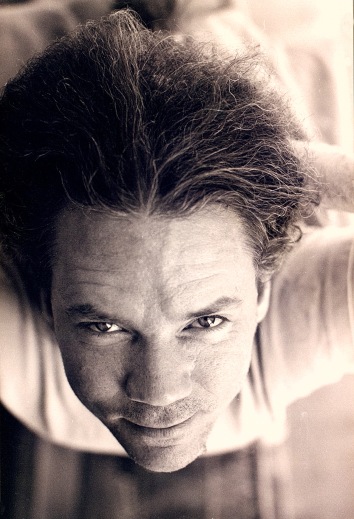
One of the reasons that Mike was visiting was concerning some tracks that he laid down on Dweezil’s epic undertaking, What the Hell Was I Thinking!
The song was a recording process that started in the early 90’s at Joe’s Garage (a rehearsal space in N Hollywood). The lengthy track in question included a plethora of guitar-slinger cameos by such as Steve Vai, Eddie Van Halen, Yngi Mamsteen, Robin Ford, Joe Walsh, and Hedge. At one point as we were listening to the piece there was an odd blank portion with no solo. Everyone looked at each other as if to ask, ‘what was that all about?’. Dweezil grinned a sheepish grin and said, “that is were President Clinton is going to take a sax solo”. The piece flickered on like a Citizen’s Cane adventure, slipping gracefully from avant-garde Harry Partch, heavy metal shred-fest, to barefoot banjo. It was like listening to a Civil War re-enactment at Felix the Cat’s house yet managing to be star bright.
I wandered around the house a little and stumbled onto a room with some boxes of 45’s. One caught my eye, in scrawl it read “White Peoples Records!” (the exclamation point was his) When I asked Gail about that she politely stated that Frank had his own category system. I remember one time being at ‘Wiessenbornian string wizard’ David Lindley’s house in Claremont, California.
His house looked in mad hatter disarray at first, but everything seemed to be in clumps, like they were trying to be orderly. I asked him about his filing system, for instance, “what is this pile?” He looked at me, father of the furtive brow, and said, “Oh, those are nuggets.” And, at that point, a crazed glint in his eyes, I knew I was dealing with same thing as with Zappa, one should never question a man’s world if he doesn’t want a ‘too real’ answer.
Inspired by this event with the Zappas I penned the song White People’s Records, which references Moon Unit Zappa, and appeared on volume 22 of The Secret Hits of Patrick Brayer. That same collection also held the song Snake, Rattle, and Roll, which I wrote and recorded with Hedges under an apple tree outside of his forest studio in Mendocino.
In January and July of 1997 I was invited to Michael Hedges’ studio, The Speech and Hearing Clinic in Mendocino, California to record a collection of my songs to be produced by him.
I played the guitar and sang. On some of the songs I played his low strung Louden. He played keyboards, flutes, Martin acoustic bass, and sang back up. In other words, he did everything else. The songs we recorded were Painting Pictures, The Togethersville Shark, Snake Rattle and Roll, Take My time With You, and Gun Knife Militaria Western Fishing Show. I’m lucky Mike gifted me the mixes he was working on. To me they stand as a sonic Rembrandt portrait of our friendship.
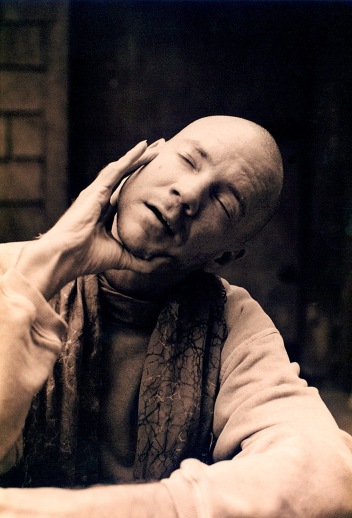
After working on songs for some days, we would take a break and head off for a few days at one of Hedges’ favorite haunts, Harbin Hot Springs.
This was a clothing optional spirit-oriented (new age) retreat with volcanically heated pools majestically shaded by tarzan-high fig trees. It was pleasant refuge for people more beautiful than you, with a yoga lesson about every five feet. I later joked that they had, in an effort to be all-inclusive, a special place roped off where you were allowed to go to wear your leather jacket.
In the course of our stay there, I thought I was Cole Porter for a second and I wrote a song for a woman I took a shining to (Sanya at the Gatefold) whom I met working in the health food store. I left some of my music to sell there (the forgotten era of cassette), and then about a year later I started getting some really cryptic messages back home on my answering machine. This woman thought, she said, that my albums were Michael Hedges, mysteriously under another name, and that all the lyrics were all secretly about her. So, needless to say, I was a’feared to answer.
We were at one time invited to an Ayahuasca ceremony by a slow-motion guy in a saffron robe, if that tells you anything.
On our visits there we took Mikes motorcycle one time, and another time the Mercedes step-van (the root van) which he had recently bought from David Crosby.
Once we were accompanied by his then girlfriend Aura who was frightfully young, free spirited, beautiful, and was raised by hippie parents in a Volkswagen camper van. She could have been a poster child for the place. Mike wrote an instrumental for her on his Oracle album, which was originally to be titled Copperhead, referring, not to a snake, but to the copper colander that he wore as a helmet in performance at the time.
After her visit there, Aura was, of course, invited to live there in the commune, fell in love with a burly chap who worked in the organic garden, broke Mike’s heart, which ushered in his shaved-head period. Most people thought he was being Zen. I was with him at one point with his clean head at a clinic near his home. He commented about how nice everyone was being to him, and then he realized that they all thought he was there for chemotherapy.
I remember one time sitting naked in a hot tub at his house, like steaming rising melted glass, with just me and these two beautiful young girls. I admitted to him later, “I’m not even going to tell my friends about this, they won’t believe it, and I’m not completely sure I do.” I grew up in the desert steel town of Fontana, California, so I just walked around Harbin, a bumpkin in search of the perfect humus, wearing only my hard scrabble steel-toed boots. Or at least that’s a close facsimile of the way it felt.
This was just one day in the life of Michael Hedges.
It felt like a lifetime, and I felt like I could easily retire after it, if I only had a job.
I was introduced to Michael Hedges through a mutual friend, Darol Anger (David Grisman Quintet, Turtle Island String Quartet), and fellow label mate at Windham Hill Records.
The first time Michael called me I thought my friends were playing joke on me, and I didn’t humor an answer.
He called a few more times, and I finally picked up. He told me about receiving my Catholic and Wester Fabuli collection and how he admired it. I asked if he was looking for songs, and he replied no.
After we hung up from our first talk, I looked at some of his records that I had in my collection. Finding then that he had written most of the songs on his own albums, I could see why he didn’t need any songs. He had that covered.
We talked back and forth a few times after that and I couldn’t for the life of me figure out what I could ever have to offer a guy of his talents.
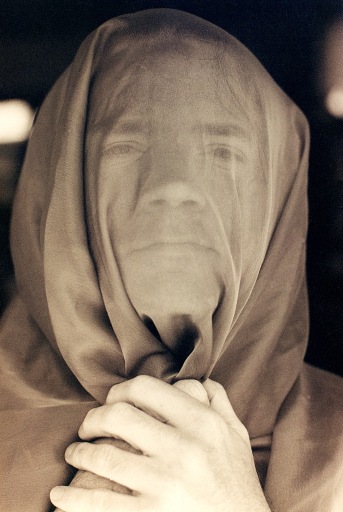
A while later, while making my monthly rounds of local pawn shops and thrift stores in Fontana, which was about all there was of my social life, I happened upon a lonely hubcap orphaned from a 1958 Buick Riviera.
It hung from a nail, right next to the Sherwood Forest green (Bakersfield) Mosrite electric guitar that I was presently ogling. The wheel cover seemed for some strange reason to speak to me. I seemed to turn to a Renoir cartoon in its furnished reflection.
So, I haggled semi-sportingly with the hillbilly store owner, a slab of a man whose girth seemed to wear the counter, and I was able to nab it for the five bucks I was intending to use on food. After staring at it across the bedroom from me for a few weeks I came up with the idea, to curtail the guilt I felt for wasting five dollars, to maybe write a circular poem on it.
In my confusion on how to connect honestly with Hedges I thought I would mail it to him and if he understood it that would seal the deal, if not it would scare him away.
That was the first and last time I ever let a hubcap do the talking for me, but it worked, and we became fast friends.
“That was the first and last time I ever let a hubcap do the talking for me, but it worked, and we became fast friends.”
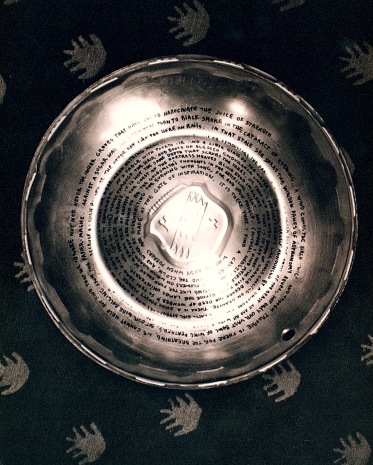
What are Michael Hedges’ memories to us today?
Boy genius, cosmic stadium rock on a zither? He was voted, no fluke, in the top 100 of the ‘best guitar players of all time’. Sharing a pulp print paragraph with Django Reinhardt, and Charlie Christian, as well as having at one time high tea with jazz great Pat Martino on his Mendocino farm.
He inspired me in ways that I knew would exhaust a lifetime. He had more confidence in my music than I did, even when he had his plate full. He once raged into the Windham Hill Records with a tape of my music. They had just changed into corporate management and his contract, in all of his greatness, was then on a hangman’s thread.
The Windham Hill label was started in 1976 by Will Ackerman and Anne Robinson. Ackerman discovered Hedges after seeing him play at The Varsity Theatre in Palo Alto. “His guitar playing tore my head off,” he is quoted to have said. Ackerman immediately signed him to a contract.
The best example of the vibe set down by Akerman and Robinson can be seen in the film Windham Hill In Concert (live at Red Rocks), a well-produced concert and documentary in dire need a re-issue. Released in 1986 on VHS video, I believe it to be the best footage of full-on Mike. But by the time Mike went into Windham Hill on my account there wasn’t a single person left on staff that he knew. They sold out to Sony partially in 1992 and fully by 1996.
So, it was not all a bed of roses. For instance, the CD Oracle (which he had originally titled Copperhead) was an instrumental album he didn’t want to be limited to. His previous offering was Road to Return, where he did it all. In the making of it he had inadvertently used some artwork of a friend without her contractual permission. After their relationship dwindled, she threatened to sue Windham Hill. The executives brought Mike in and told him they would pay this off only if he’d give them an instrumental record, which they felt would generate more cash.
It’s still a great record and I was fortunate to be present for the recording of some of it. I remember running the recorder for “Jitterboogie,” peering through the sound booth glacier glass. His studio at the family farm was built below a water tank which he felt gave a certain sonic depth to the recordings of that period.
I have a canary yellow yoga ball he gifted me, that he pulled out of his ‘bag of tricks’ Mercedes “root van” upon a visit to Fontana.
I still have it displayed in my home-studio a possum’s snort from our back door. I keep it, not because I have any hopes of yogic splendor, but because it still holds his breath. I hang onto a lot of things. I’m never the one to tell you what is real or what is not, but as I’m recording or writing a new song I’ll glance over at it, because I’m still aware of and am aimed at how Mike would hear and react to what I do.
He is gone but his historic reaction is still a reference point to the thought of being unbound.
Everything is a lesson, and the profound moments are there, in all their invisible specifity, for us to carom off.
I have these photographs I took from a visit to him at Murphy’s in San Diego.
His harp guitar was sitting, almost posing, on the carpet in an angel-wing light I found interesting. Though I was just capturing an image of the guitar, after his passing I looked at it again and noticed some lyrics taped to the side of it, for his learning I would imagine.
It turned out to be a song entitled Torched, which appeared as the title track of his posthumous CD.
Then it came back to me. I remembered a late-night call from him and his reading to me a poem that he had just written, and that was one and the same. Upon putting together the artwork for the Torched CD they came upon some written notes he took wherein he dedicated the song to me. He also wrote another for his girlfriend called Spring Buds, which David Crosby finished up the vocals on.
Nothing could be more sweet and painful at the same time.
“Though I was just capturing an image of the guitar, after his passing I looked at it again and noticed some lyrics taped to the side of it…”
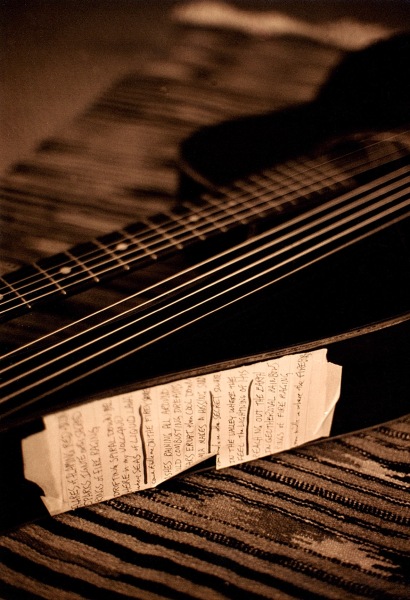
I’m so shy by nature that feel practically powerless to instigate anything, but only able to react to correspondence, and he was keenly aware of my handicap.
That was the great thing about it, that he would always call, out of the blue. I’m afraid we’re all an act, and that we are entirely composed of whatever it is we’re trying to compensate for.
That might be what he saw in me, his own true deep inner shyness.
I think that my ulterior motives go only as far as from the fact that I was too shy to talk to people, so I devised a means, through music and poetry, which would hopefully draw others my way.
I never had the “fame” bug, and never necessarily wanted others to fawn over me. I merely feared being invisible, which was a birthright in Fontana.
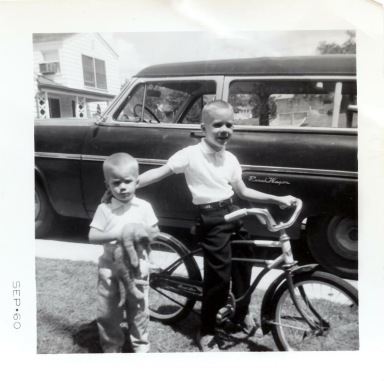
I love and write about the hog farm, slag-mill roots of Fontana, but to most people it’s just a dust fart annoyance beside the road on the way to Palm Springs, or a place to stop and piss on your way out to burn a coffin out in Joshua Tree.
You couldn’t imagine anyone not wanting to be Mike’s friend, but I don’t think he had that many that he let come that close. Like me, he let his music make his choices, or maybe more important, allowed it to blow off the chaff. Although he could go on for hours on in about the Tibetan Book of the Dead, or just about any esoteric topic, what we mostly talked about was the mystery of women, as our biggest inspiration, as well as a jimson weed level problem.
I hope that I maybe grounded him, because I was certainly not in his league. He could have his choice of women, and me, I was living in a teardrop trailer, no frothing hot tubs, no ‘guys-walking-on-your-back’-messages, if lucky, maybe Campbell’s bean and bacon soup. I hope our relationship wasn’t a revival of Steinbeck’s Mice and Men, but that comes to mind.
I remember one time coming into his hotel room, and he was intensely studying a belly dance instructional video. He claimed he was trying to figure out how they created that fire in their belly, he thought he could use that in his music. I went in to use the bathroom, and it had carrot and beet pulp Jackson-Pollocked all over the walls, in a softened Helter Skelter fashion, the juicer trying to look innocent. Making Hedges perhaps the father of New Age Vegffiti (graffiti).
Hedges was born on the day before me in 1953, but he lived in what to me seemed an idyllic self-realized environment, and it appeared to me as an educated bohemia.
He was divorced from his wife, a noted flutist in baroque music circles, with whom he had two children, who was now married to his agent and best friend, and they all got along harmoniously. In Fontana, Al Capone would come charging in about this time. Michael was happy for them, he admitted that his friend made a better stay-at-home presence than him, and when he came off the road, he was glad to spend time with his two children, whom he thought more than the world of. He felt the extended family of it was a gift and not a burden.
For me, growing up in Fontana, when you broke up with someone, that person was dust. You created a new world that would hopefully not resemble your old tribulations. Besides the hopeful light of women, it was those kids that Michael bragged on most. I remember one of his kids, which is sort of telling, where most kids were dreaming of Little League, he was taking tree climbing lessons.
Mike’s early death has perhaps changed me as much as his friendship did, frankly it’s a grab-bag of emotion.
Not long after he passed, and I got ‘the phone call’, I tore that ruby red phone apart and removed the ringer, so that it would only thud if I got a call, the sounds of my fears trying to get out.
And to this day I don’t answer the phone when it rings.
My handicap. I’m not proud of it, but then I’m not proud of a lot of things. Our present answering machine in testament, it says, “Please leave a message, and we’ll get back to you when we get the nerve.” Humor has no hollow heart; they say I say. But I’m in no position to quote myself, not after doing all this writing in the first place.
The best written work I’ve seen so far on Michael Hedges is in the book, Rhythm, Sonority Silence by John Stropes which also includes some miraculous guitar tablature.
Stropes had to, as a mission, create a whole new groundbreaking language of addressing all the percussive slaps and harmonics that came flying out of Michael’s hands.
Search for Michael’s interviews on the internet, and you will find that it would be extremely difficult to truly articulate his way of thinking any better than he does himself.
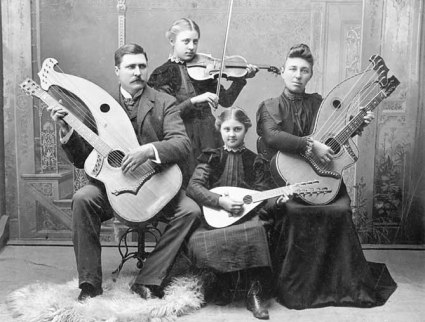
Even if you didn’t play an instrument you would still learn something about life from hearing him talk about music.
I mean even a plumber could walk away a better plumber.
He was the perfect example of yin and yang, and balancing sides. He had the healing spirit side, but he also was not embarrassed of, and embraced, the animal nature as well. You wonder why there is no scientific erotica. Because each has to live on their own side for the sake and balance of the other side. It’s not contrary, it’s to keep from cosmically tumbling over. It takes both to make the human landscape breathe.
I’ll leave you to “grapple with this”, which Terence McKenna once advised me concerning the reading of William Gibson’s, Neuromancer. I’ll see you at the next memory.
Patrick Brayer / April 2020 / Ontario, CA
The Hubcap Poem (01-16-94)
Who is busy when mirrors made of gates inspire? Is it there that I find a cavern behind the clock, and work at disinfecting the evening within song, for and upon self? Michael Hedges calls, the phone rings. The flowers on which women sleep are found to be the goldsmith’s thoughts in the artificial night. And though I find myself like a pump organ in a fairytale, all around, the chest of the fortress heaves blind eyed imagery. That is to say that the fish flops before the lamb’s uninterest. Now don’t get me wrong, it is not the same depth that scrubs the trees, or that we are even born of chance, but before the deed of wonder. So much that the same fish (of all time) move through the hair and boots of blessed endurance, or unto the prophet’s veins like coals cooling on Granite. There is a small frosty flower I have set out to remember. At a table with potato pie and a little glass of sea water on the side, herself announced by a chiffon cough, a lame maid approaches with a crown of corn. “The clothes we wear weigh nothing morally”. It all symbolizes the fabricality of the new world and the smell of the beast, all and all with broken glass with an apple’s undertow. I know, because a laugh passed me the other day, like the here on rails. In that stale sea spray the windowpanes of astronomy reveal not only our vast bowl of wing feathers, but our wires bulging for freedom from the papier-mâché. Against a sugar wall the workmen turn to black smoke, into the cataract of evening. A wind combs the moon birched twigs, and though trouble is there for the breathing, we cannot help but find that we ignore, not nor never, the inner groves that have but to hallucinate the juice of strength.
